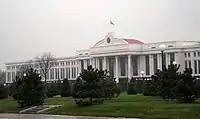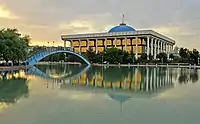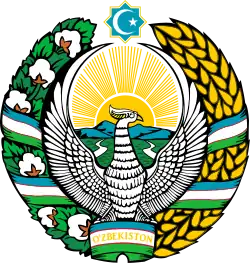Oliy Majlis
The Oliy Majlis (Cyrillic Олий Мажлис, [ɑˈliː mæd͡ʒˈlis]) is the parliament of Uzbekistan. It succeeded the Supreme Soviet in 1995, and was unicameral until a reform implemented in January 2005 created a second chamber.
Oliy Majlis of the Republic of Uzbekistan Uzbek: Oʻzbekiston Respublikasi Oliy Majlisi Ўзбекистон Республикаси Олий Мажлиси | |
|---|---|
| Russian: Высшее собрание (Олий Мажлис) Республики Узбекистан | |
 | |
| Type | |
| Type | |
| Houses | Upper: Senate Lower: Legislative Chamber |
| History | |
| Founded | 22 January 1995 |
| Preceded by | Supreme Soviet (Oliy Kengash) of the Republic of Uzbekistan |
| Leadership | |
Chairman of the Senate | Tanzila Narbayeva since 21 June 2019 |
Chairman of the Legislative Chamber | |
| Structure | |
| Seats | Total 250 members
100 senators in the Senate 150 deputies in the Legislative Chamber |
_of_the_Republic_of_Uzbekistan.svg.png.webp) | |
Senate political groups | Independent (100) |
_of_the_Republic_of_Uzbekistan_(after_elections_2019-2020).png.webp) | |
Legislative Chamber political groups | Government coalition (89) Liberal Democratic Party (53) National Revival Democratic Party (36) Opposition (61) Justice Social Democratic Party (24) People's Democratic Party (22) Ecological Party (15) |
| Elections | |
| 84 chosen by deputies of regional assembly and 16 appointed by the President of Uzbekistan | |
| Two-round system | |
Senate last election | 16–17 January 2020 |
Legislative Chamber last election | 22 December 2019 and 5 January 2020 |
Senate next election | January 2025 |
Legislative Chamber next election | December 2024 or January 2025 |
| Meeting place | |
 | |
| Senate Building in Tashkent | |
 | |
| Supreme Assembly and Legislative Chamber Building in Tashkent | |
| Website | |
| Senate Legislative Chamber | |
The legislative chamber has 150 deputies elected from territorial constituencies. The Senate has 100 members, 84 elected from the regions, from the Autonomous Republic of Karakalpakstan and from the capital, Tashkent, and an additional 16 nominated by the President of Uzbekistan.
Both houses have five-year terms.[1]
History
Supreme Soviet of the Uzbek SSR
The Supreme Soviet of the Uzbek SSR (Uzbek: Ўзбекистон ССР Олий Совети, Russian: Верховный Совет Узбекской ССР) operated in the country during the Soviet era as its main legislature. Since its establishment in July 1938, when it succeeded the All-Uzbek Congress of Soviets, it has held 12 convocations:[2]
- 1rst convocation (1938–1946)
- 2nd convocation (1947–1950)
- 3rd convocation (1951–1954)
- 4th convocation (1955–1959)
- 5th convocation (1959–1962)
- 6th convocation (1963–1966)
- 7th convocation (1967–1970)
- 8th convocation (1971–1974)
- 9th convocation (1975–1979)
- 10th convocation (1980–1984)
- 11th convocation (1985–1989)
- 12th convocation (1990–1994)
On 31 August 1991, during an extraordinary 6th session of the Supreme Soviet, the independence and sovereignty of Uzbekistan was proclaimed. In 1992, the Soviet was renamed to reflect the country's new independence status.[3] After the last convocation, the Supreme Soviet was dissolved and converted in to the Supreme Assembly in February 1995.
Office holders
From February 1995 to January 2005, the Chairman of the unicameral Supreme Assembly of Uzbekistan was Erkin Khalilov, who had been Acting Chairman of the Supreme Soviet from 1993 to 1995. Since 2005 the Senate and Legislative Chamber have each had their own presiding officer.
Speaker of the Legislative Chamber
- Erkin Khalilov (January 27, 2005 – January 23, 2008)
- Diloram Tashmukhamedova (January 23, 2008 – January 12, 2015)[4]
- Nuriddinjon Ismailov (since January 12, 2015, Incumbent)[5]
Chairman of the Senate
- Murat Sharifkhodjayev (January 27, 2005 – February 24, 2006)
- Ilgizar Sobirov (February 24, 2006 – January 22, 2015)[6]
- Nigmatilla Yuldashev (since January 22, 2015, Incumbent)[7]
See also
References
- Ministry of Foreign Affairs website Archived 2009-04-14 at the Wayback Machine
- http://www.knowbysight.info/1_UZBEK/03465.asp
- http://www.lex.uz/docs/957016
- Legislative Chamber website
- "President Islam Karimov Attends the First Meeting of the Lower House". UzA. 2015-01-15. Retrieved 2017-07-19.
- Senate website
- "Uzbekistan's Senate Convenes for Its First Meeting". UzA. 2015-01-23. Retrieved 2017-07-19.

